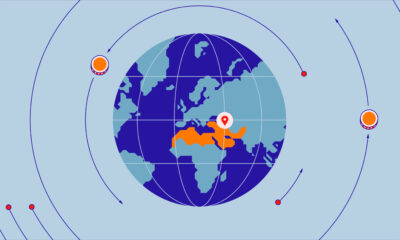News
MENA Digital Economy Set To Hit $400 Billion By 2030
Education and health technology sectors alone are forecast to reach a combined market size of $20 billion by 2030.

Although COVID-19 sent shockwaves through brick-and-mortar retail businesses and decimated the travel industry, the world’s digital economy actually reaped enormous benefits from lockdowns and reduced movement.
According to newly released data, the digital economies of the Middle East and North Africa (MENA) countries are now estimated to be worth an incredible $400 billion by 2030.
To reach the enormous milestone in under ten years, the entire region’s economy will need to undergo rapid transformation. Sectors including food, travel and bill payment have declined in recent years. However, health and education technology appear to be booming — though predictably, online retail is driving much of the growth, increasing at a rate of 20% per year alone.
According to the report, Generation Z will fuel a great deal of the decade’s growth, and the expansion of EdTech services will require significant skill development, with schools and higher education institutions adding new technology-focused courses to their curriculums.
Also Read: Saudi Arabia To Send First Female Astronaut Into Space By 2023
Saudi Arabia and the United Arab Emirates have already significantly contributed to the region’s global digital expansion. Future growth is anticipated to be more evenly spread among the MENA countries, as the two leading nations currently account for half of the area’s total digital economy.
According to the new survey, the rest of the MENA region is improving in its rate of digital adoption, with the time spent on digital channels now nearing 8 hours per day, which is a figure similar to the United Arab Emirates and Saudi Arabia.
News
Mamo Completes $3.4M Funding Round To Enhance Fintech Services
The startup will use the influx of cash to expand into Saudi Arabia and across the wider GCC while improving its product offering.

UAE-based fintech Mamo has announced the completion of a $3.4 million funding round that will help the startup extend its market presence and improve its product offering. Investors included 4DX Ventures, the Dubai Future District Fund and Cyfr Capital.
Mamo’s platform offers “payment collection, corporate cards and expense management” to help small and medium-sized businesses consolidate and streamline their operations. With the latest influx of capital, Mamo will further develop its comprehensive suite of services and begin testing its product lines in Saudi Arabia, further extending its footprint across the GCC.
Imad Gharazeddine, co-founder and CEO of Mamo, stated: “We’ve been in the market for a while now and are incredibly proud of what our team has achieved. The holistic and expansive nature of our product offering has helped us continue to grow sustainably. This additional funding will allow us to reach our medium-term goals even faster. The support from new and existing investors is a testament to our strong expertise and the ability to deliver on our customer promise”.
Daniel Marlo, General Partner of lead investor 4DX Ventures, added: “We have immense trust in Imad’s vision, leadership and Mamo’s innovative approach to provide a user-friendly and comprehensive financial solution for SMEs that makes financial management more accessible and efficient. We are proud to partner with them and support their mission”.
Also Read: A Guide To Digital Payment Methods In The Middle East
Amer Fatayer, Managing Director of Dubai Future District Fund’s investment team, also commented: “Mamo’s localized product lines serve as an infrastructure for SME payments and spend management in UAE, a segment that is underserved by the country’s current banking infrastructure. The team has taken a product-first approach to consolidating SMEs’ financial journeys and building a fintech solution deeply embedded in a business’s core operations”.
To date, Mamo has raised around $13 million in investment funding and now boasts a team of 30 people. The company’s intuitive financial services platform has allowed over 1,000 businesses to consolidate their financial operations and significantly reduce payment fees.
-

 News4 weeks ago
News4 weeks agoAmazon Prime Day 2024: Get Ready For 6 Days Of Amazing Deals
-

 News4 weeks ago
News4 weeks agoSamsung Unpacked 2024: What To Expect From The July 10 Event
-

 News4 weeks ago
News4 weeks agoCoursera Report Shows Surge In UAE Interest In AI Upskilling
-

 News4 weeks ago
News4 weeks agoMeet Dubai’s Groundbreaking Smart Robot Delivery Assistant
















